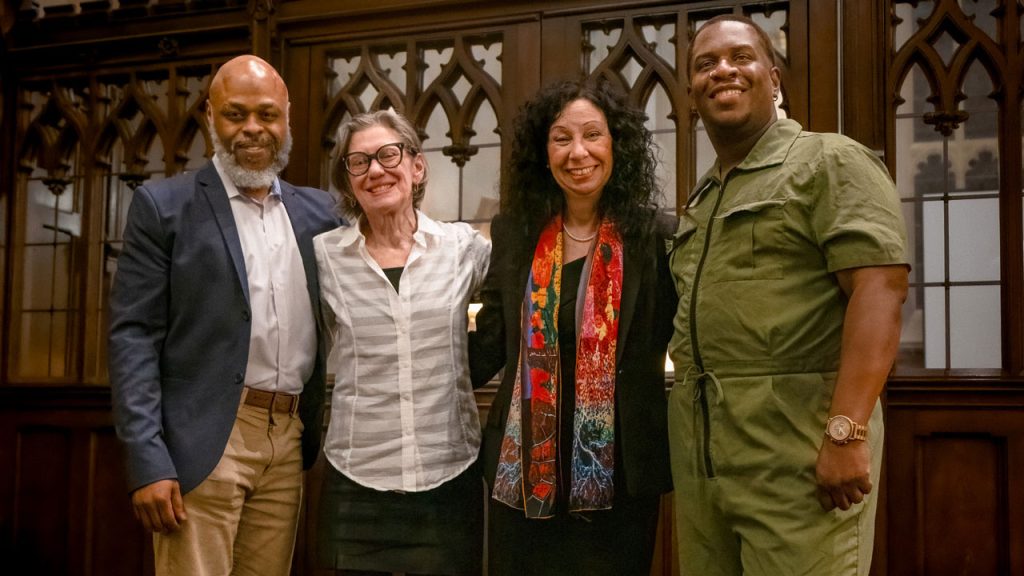“Well I thanks you for my birthday message.
I am thirty-five years old and still have all my teeth.”
—Flannery O’Connor, Letter to Betty Hester, April 2, 1960
On March 25, 2025, the late American Catholic fiction writer Flannery O’Connor would have reached 100, and though she is no longer among us bodily, her spirit of wit and wisdom was alive and well at the celebration hosted by the Curran Center for American Catholic Studies on her birthday in Tognino Hall.
As the associate director of the Curran Center and the person who oversees the Flannery O’Connor endowment granted to the Center by the O’Connor Trust in 2018, I was delighted to welcome internationally-acclaimed director and founder of theater troupe Compagnia de Colombari, Karin Coonrod, and two of the company’s actors, KenYatta Rogers and Carlton Terrance Taylor, for a screening and panel discussion of their theatrical production of “Everything That Rises Must Converge,” O’Connor’s iconic story about race during the civil rights movement in the American South. Roughly 100 community members and Colombari fans joined us.

O’Connor wrote her story in 1961, just as desegregation was beginning in the South—though it would not be published until 1965, a year after Flannery’s premature death at the age of 39 from lupus. In the course of the story, O’Connor depicts a full spectrum of beliefs and behaviors with regard to race and civil rights, including characters who range from ignorant racists to exhausted and beleaguered victims of racism.
As one reads the story and watches the play, it becomes painfully evident that O’Connor’s words speak uncomfortable truths and have much to say to us now about race in America a half-century after it was written. O’Connor holds up the mirror to our society, revealing the ways in which racism is still part of the social fabric, despite our best efforts to change.
At the panel discussion, Fordham professor of African and African American Studies Mark Chapman, Coonrod, Rodgers, Taylor, and myself spoke of being moved by the story and astonished by O’Connor’s ability as a writer to see into the heart of the problem of race in America and portray it with courage and unflinching honesty.
This is particularly remarkable, given the fact that, as recent scholarship, including my own book Radical Ambivalence, has revealed, there is evidence in O’Connor’s private letters that she herself was afflicted by the sin of racism. Having been born and raised in the Jim Crow South, Flannery breathed in the toxic animosities of racism from childhood onward and struggled against them. The conflict between her cultural upbringing, and her ingrained Catholic belief that all people are created in the image and likeness of God shows up in her writings in various ways. O’Connor’s fiction is the proving ground wherein these opposing ways of thinking about race play out and come into sometimes violent conflict.
And yet, despite the seriousness of the subject under consideration, the tenor of the evening was one of celebration and appreciation of O’Connor’s gifts as an artist and visionary. Those who read and study Catholic literature value O’Connor for her Catholic imagination, the uniquely Christ-centered perspective and worldview she brings to bear on human experience.
Even as her stories depict human frailty—often quite mercilessly—they also raise our gaze to the prophetic, holding open the possibility for conversion, forgiveness, and grace.
Happy 100th Birthday, Flannery—here’s to 100 more.
Angela Alaimo O’Donnell, Ph.D.
Associate Director, Curran Center for American Catholic Studies


